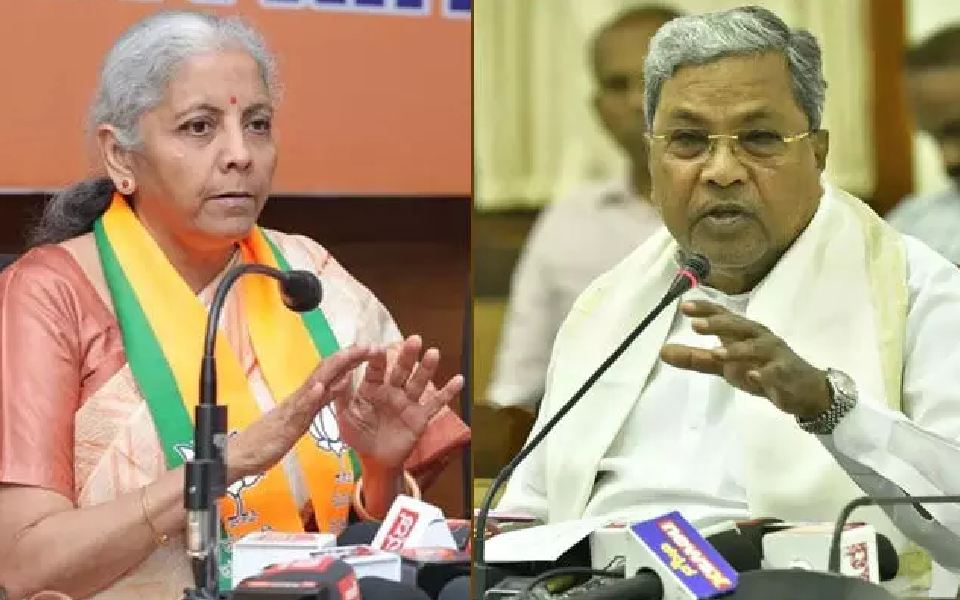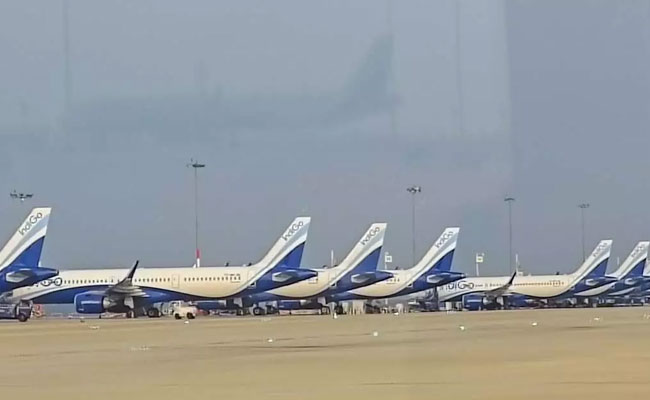Bengaluru, Jul 29: Karnataka Chief Minister Siddaramaiah on Monday urged Prime Minister Narendra Modi to immediately remove Nirmala Sitharaman from the cabinet, asserting that it is extremely dangerous to have her as the Finance Minister without basic budgetary knowledge.
He emphasised that entrusting the finance portfolio to someone lacking fundamental understanding is a 'highly risky' decision.
The CM while speaking about Nirmala Sitharaman's Sunday press conference criticised the FM for her alleged "desperate attempts to cover up the injustices done to Karnataka by the Modi government".
He noted that Sitharaman's misleading statements ultimately reveal that the central government has provided minimal support to Karnataka.
ALSO READ: CM accuses Nirmala Sitharaman of "lying", says BJP trying taint Karnataka as "corrupt state"
"According to Sitharaman, the previous UPA government (2004-2014) granted Karnataka Rs 60,779 crore, whereas the NDA government (2014-2024) provided Rs 2,36,955 crore. However, they have forgotten to mention how much the central government's budget size has increased over the past ten years. Whether this omission is due to ignorance or a deliberate attempt to mislead the public needs to be clarified," a statement shared by the Chief Minister's Office said.
In 2013-14, the central government's budget was Rs 16.06 lakh crore. At that time, Karnataka received Rs 16,428 crore as grants and Rs 15,005 crore as tax share, totalling Rs 31,483 crore, which accounted for 1.9 per cent of the total budget, he pointed out.
In 2024-25, the central government's budget size is Rs 48.02 lakh crore. During this period, Karnataka will receive Rs 15,229 crore as grants and Rs 44,485 crore as the tax share, totaling 1.2 per cent of the budget. If Karnataka were to receive the same 1.9 per cent share as in 2013-14, the state would get Rs 91,580 crore. Due to the unfair treatment by the Narendra Modi government, Karnataka has lost Rs 31,866 crore for 2024-25, he said.
"Finance Minister Nirmala Sitharaman has made misleading statements claiming an increase in Karnataka's tax share from the central government. According to her, Karnataka received Rs 81,791 crore during the UPA government and Rs 2.9 lakh crore during the NDA government (2014-2024)."
However, the 14th Finance Commission set Karnataka's tax share at 4.72 per cent, which the 15th Finance Commission reduced to 3.64 per cent, resulting in an estimated loss of Rs 62,098 crore in the tax share alone over the past five years. Sitharaman has attempted to conceal this significant reduction. Grant in aids for 2024-25 is still less than that we received in 2013-14 under UPA, Siddaramaiah said.
He further said that Karnataka ranks second in the country for GST collection and first for GST growth at 17 per cent. Despite this, the state receives only 52 per cent of the collected GST funds. Due to the unscientific implementation of GST, Karnataka lost about Rs 59,274 crore from 2017-18 to 2023-24.
According to Siddaramaiah, in 2023-24, the Centre collected over Rs 4.30 lakh crore from Karnataka in taxes, cesses, and surcharges, but returned only Rs 50-53,000 crore, equating to just Rs 12-13 for every Rs 100 collected, including Rs 37,000 crore in tax share and Rs 13,005 crore for central-sponsored schemes.
"Over the past six years, the union government's budget has nearly doubled. In 2018-19, the budget was Rs 24,42,213 crore, with Karnataka receiving Rs 46,288 crore. By 2023-24, the budget grew to Rs 45,03,097 crore, but Karnataka received only Rs 50,257 crore. Despite the budget doubling, Karnataka's share remained unchanged," he noted.
"After recognising the significant injustice done to Karnataka, the 15th Finance Commission recommended a special grant of Rs 5,495 crore for the state. However, this recommendation was rejected by Finance Minister Nirmala Sitharaman, who is a representative from Karnataka. As a result, Karnataka did not receive the recommended funds," he alleged.
"Due to the central government's discriminatory policies, Karnataka has been deprived of its rightful share of Rs 1,87,867 crore from 2017-18 to the present. This amount is more than half of Karnataka's revised budget size of Rs 3.24 lakh crore. Specifically, it equates to 57 per cent of the current fiscal year's (2024-25) budget. This significant financial loss has occurred since the BJP-led central government took power."
Additionally, the 15th Finance Commission recommended Rs 3,000 crore for Bengaluru's Peripheral Ring Road and Rs 3,000 crore for water resource development, including lakes. However, Finance Minister Nirmala Sitharaman rejected these recommendations, resulting in a loss of approximately Rs 11,495 crore for the state, he claimed.
"Over the past ten years, Prime Minister Narendra Modi and Finance Minister Nirmala Sitharaman have unjustly allocated taxes and grants to states governed by opposition parties. It is ironic that Nirmala Sitharaman, who was elected to the Rajya Sabha by Karnataka, has acted against the state's interests. Given her actions, she lacks the moral authority to speak about Karnataka's financial status," he added.
Let the Truth be known. If you read VB and like VB, please be a VB Supporter and Help us deliver the Truth to one and all.
Shivamogga: A total of 693.75 of river stretches across Karnataka are polluted, and water from several of these rivers is being supplied to towns and cities, the State government informed the Legislative Assembly.
According to a report published by The New Indian Express on Monday, replying to an unstarred question by Thirthahalli MLA Araga Jnanendra during the winter session in Belagavi, Forest, Environment and Biodiversity Minister Eshwar Khandre said rivers are classified into five categories, P1 to P5, based on Biochemical Oxygen Demand (BOD) levels, with P1 being the most polluted.
He reportedly said untreated domestic wastewater from urban and rural areas is the main reason for river pollution. Arkavati, Lakshana Teertha, Tungabhadra, Bhadra, Tunga, Cauvery, Kabini, Kagina, Krishna, Shimsha, Bheema and Netravati are the polluted rivers and so far, 112 polluted drainages along these rivers have been identified.
Khandre explained that rivers are classified into five pollution categories P1 to P5. The Arkavati River has been placed in the P1 category, while no rivers fall under P2 and P3. Tungabhadra, Bhadra and Shimsha are categorised under P4, and eight other rivers fall under P5.
Khandre allegedly said domestic wastewater from municipalities, towns and villages along riverbeds is being discharged into at least 17 rivers, identified by the Central Pollution Control Board (CPCB). This is the primary cause of river pollution.
According to the report, the minister said drinking water is being supplied from polluted rivers in districts such as Mandya, Ramanagara, Vijayapura and Shivamogga. In parts of Uttara Kannada, Ballari, Vijayanagara and Bagalkot, local bodies are also drawing water from polluted river sources.
In 2022-23, CPCB identified South Pinakini, Aghanashini, Sharavathi and Gangavali rivers too as polluted. But wrote to CPCB, stating that these rivers are not polluted and sought their removal from the list. An action plan is being prepared for the South Pinakini River, he said.
On remedial measures, Khandre reportedly said the Karnataka State Pollution Control Board is setting up sewage treatment plants as per the directions of National Green Tribunal.
As per the report, under 12 river rejuvenation plans, the state generates 817.31 million litres per day (MLD) of sewage. While 41 STPs with a capacity of 614.1 MLD are operational, 203.21 MLD of sewage remains untreated.
Work is underway to establish 19 STPs with a capacity of 248.91 MLD, while 39 more STPs with a combined capacity of 357.92 MLD are in the planning stage. Progress is being monitored and reported regularly to the NGT and the Union Ministry of Jal Shakti.
The minister reportedly said the state government gave its approval for underground drainage works worth Rs 535.56 crore in 2021 for 24 cities/towns besides Rs 523.80 crore for nine UGD projects.





